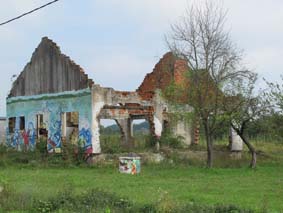 Two tiny pups were curled around one another like yin and yang outside the front door of the village community center. September bestowed a warmth upon the days, but at night cast a cool dew over the ground in warning that autumn was on its way. I opened the long, heavy doors from the spacious white-tiled hall inside the community center, and the more spritely of the two pups leapt up and expressed its unfettered joy. The tail wagged the whole scrawny body so hard, I worried it might break. I held my finger out and the little pup tried to suck it. Where was mother? These two were not done with suckling. I shared a piece of my coffee pastry, which my little friend proudly carried off into a corner to devour privately. The weaker of the two batted its eyelids, slowly, its body still curled up without the energy to rise. In the grass around the pups I could smell the mint growing everywhere. Perhaps it had spread wild from gardens that had once been here, or from the gardens of other houses now destroyed. Across the road were the remains of a brick house with great holes knocked into the sides, save the facade, upon which the arts project that I was working in had painted some bright blue graffiti. At first I found this garishly colored ruin across the muddy road leading through the small village of Kevljani in northern Bosnia to be a loud, painful scream. As the days went on, I made peace with the loud colors which became more like an "is-anybody-there?" shout for life and hope. The village and the region had been left economically destitute after the war with its unimaginable atrocities just over twenty years ago. One of the fifty residents of this village, which before the war had been home to eight hundred, sauntered down the road behind a herd of sheep. A giant unsaddled, unbridled white work horse trudged faithfully behind him. As the sheep settled in the rich green field behind the house, their shepherd rolled a cigarette on the other side of the road as the white horse watched and waited. I looked down the road from whence the shepherd and his entourage had come. Only a few hundred meters away was the site of the second largest mass grave of the war. It could have been any fallow, uneven field, except for the modest white engraved slab of stone that served as a monument in the middle. A little further down the road was a mine, still in operation today, that had been turned into a concentration camp during the war. One of my colleagues, the founder of the art project, had been an inmate there. How could he return to this place? So many neighbors and friends had met their deaths here or turned on one another, transforming life forever. Yet, somewhere in the courage to return and face the pain, was also the opportunity to discover the beauty of his home village once again, and to find solace in the peace of the grazing sheep and the smell of mint. Hell is not the end. During the days that we spent inside the community center working with teachers and students, forty persons from the surrounding communities in total, we met friendly, eager faces: those of youth unmarked by the past but with the responsibility of having to find a way to interpret the legacy of fratricide; and those of their teachers, most of them youth during the war, today trying to find a way forward both for themselves and for the youngsters, out of the memory of terror and loss they had known. During these days with this group, it seemed to me that we were all somewhere on that path between suffering and compassion. Sometimes uncertainty about one another, and fear of the new ideas we might face or even create together held us back, but only momentarily. Forty people chose patience and trust. These are not easy choices to make, but in the ruins, when all embellishments have fallen away, it becomes clear that all we really have is each other.
0 Comments
|
AuthorSee About. Archives
November 2023
Categories |
 RSS Feed
RSS Feed